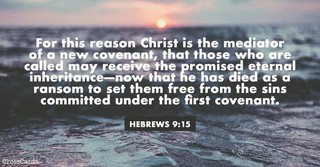
- Recent Translations
- All Translations
Yehudim in Moshiach 9:15
Share
Settings
Yehudim in Moshiach 9:15 Meaning and Commentary
And for this cause he is the Mediator of the New Testament,
&c.] (See Gill on Hebrews 7:22), (See Gill on Hebrews 8:6), (See Gill on Hebrews 8:8). This may refer both to what goes before, and what follows after; for Christ, that he might offer himself to God, and by his blood purge the consciences of his people from dead works, that so they might serve the living God, became the Mediator of the New Testament, or covenant; and also he took upon him this character and office,
that by means of death, for the redemption of the transgressions
that were under the first testament, they which are called might
receive the promise of eternal inheritance;
Christ became the Mediator of the New Testament, and assumed human nature that he might die, and by dying might obtain redemption for his people; not only for those that were then in the world, or should be in it, but also for all those that had been in it. "The first testament" is the first dispensation of the covenant of grace, reaching from the first promulgation of it to Adam after the fall, to the death of Christ; "the transgressions" that were under it are the sins of the saints who lived under that dispensation, froth Adam to Moses, and from Moses to Christ, and takes in all their iniquities of every kind: and the "redemption" of these, or from these, by Christ, at and through his death, does not suppose that there was no remission of sins, or justification from them, under that dispensation; or that the Old Testament saints did not go to heaven, but were detained in a prison, till redeemed by the death of Christ; or that their sins were only redeemed, not their persons; for transgressions may stand for transgressors; and so the Syriac version renders it, "that by his death he might be a redemption for them who transgressed the first testament"; so the Jews say, that the Messiah must die (twba ta twdpl) "to redeem the fathers" F2: but the sense is, that though legal sacrifices could not atone for sin, nor ceremonial ablutions cleanse from them; yet the sins of Old Testament saints were expiated, their iniquities pardoned, and they justified and saved, through the blood of Christ, the Lamb slain from the foundation of the world; whose death is a redemption from transgressions past, present, and to come; whose blood is the ransom price for them, and was shed for the remission of them, even of sins that are past through the forbearance of God; who took the surety's word for the performance of all this, which in the fulness of time he strictly fulfilled, to the satisfaction of law and justice; see ( Romans 3:25 ) and the ultimate end of Christ's being a Mediator, and dying for such purposes, was, that called ones might receive the promised inheritance: by the "eternal inheritance", is meant heaven, which is by gift and bequest, belongs to children only, and comes through the death of Christ; and is a very substantial, plentiful, and glorious one; it is incorruptible and undefiled, and that fades not away, and as here, "eternal"; it was prepared from the foundation of the world, and will continue for ever; and it may be so called, to distinguish it from the inheritance of the land of Canaan, or any temporal one: "the promise" of this was made before the world began, and was put into the hands of Christ, the surety of the better testament, by whose death the heirs of it come to enjoy both the promise, and the thing promised; and they are such who are "called", not merely externally, but internally and effectually; by whom were meant, not Abraham and his natural seed, nor the Old Testament saints only, but all that are called with an holy calling, whether Jews or Gentiles, and who will enjoy both the promise of the inheritance, and that itself, in a way of "receiving": every word shows this affair to be all of grace; it is an "inheritance", and therefore the Father's gift; it is by "promise", and so of grace; and it is "received", and so freely given, and not merited; and only such who are "called" by grace possess it; and yet it is through the death of Christ, that so it might be received in a way consistent with the justice of God.
F2 R. Moses Haddarsan apud Galatin. l. 8. c. 20.
